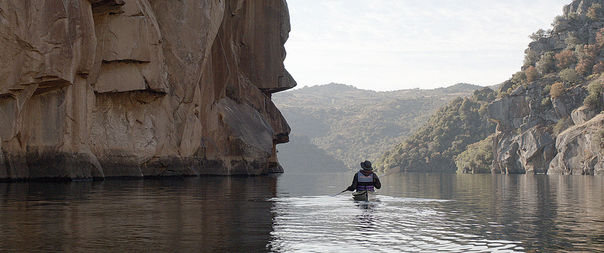João Pedro Rodrigues and the Birds that See Everything
by Aisha Rahim

The Ornithologist
A snippet of a memory: a silhouette of a dog in the foreground of Phantom (O fantasma, 2000). Sixteen years later, nothing seems random about that four-legged figure with which João Pedro Rodrigues opened his first feature film. It seems to foretell a grim clash between desire and sentimentality in the character of Sergio, a young man on the brink of adulthood whose transformation –or metamorphosis—seemed better explained through images than words. The image was also a harbinger of a set of films that inhabit the space between human and animal.
In The Ornithologist (O ornitólogo), the Portuguese director’s fifth feature film and winner of the most important award of his career, the Leopard, at the 69th edition of the Film Festival Locarno, the same elements arise in the mountainous landscape of Douro, in the Northern Portugal. We follow an ornithologist whose ambivalent sweetness is reminiscent of James Stewart in Anthony Mann’s westerns. Binoculars in hand, he is looking for Egyptian vultures and black storks. We don’t know who is looking for whom when it suddenly seems that the birds can see it all. There is even an owl that can scan the darkness of the theater and see the reflection of the filmmaker in main character.
Rodrigues is surely creating more metamorphoses. Imagine the ornithologist as Saint Anthony, the 13th-century Franciscan priest, on an saintly quest where the filmmaker’s various fetishes appear along the way. These include his childhood fascination with birds, the saint’s name is in the title of his short film Morning of Saint Anthoiny’s Day (Manhã de Santo Antônio) , the Chinese pilgrims who seem to blink at the “Asian films” made by Rodrigues in a partnership with Guerra da Mata… Even if we aren’t convinced of the absolute consistency of this skewed approach to the patron saint, it is clear that Rodrigues seems to believe in the beatitudes of the cinematographic illusion.
If there is a chemical reaction between these disparate elements it is befitting of the style of director of photography Rui Poças, with whom Rodrigues has worked on films like Phantom and Odete. It is Poças who draws us in, in CinemaScope, to the pilgrimage between the sacred and the profane, between beliefs and myths, delirium and nightmares, still lives and death.

